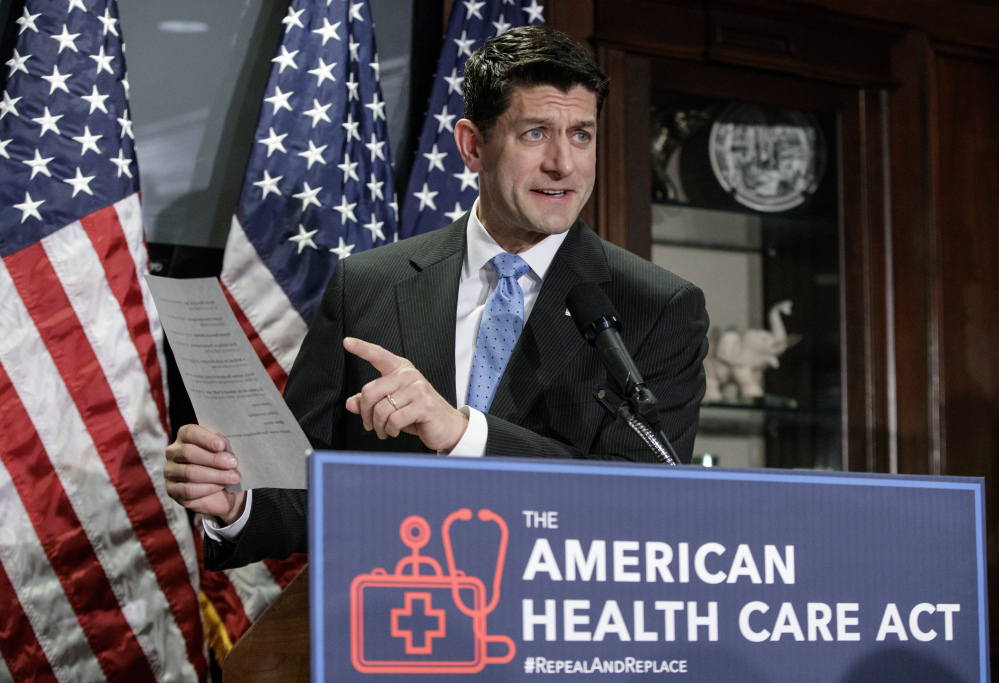WASHINGTON — Major associations representing physicians, hospitals, insurers and senior citizens all leveled sharp attacks Wednesday against the House Republican plan to replace the Affordable Care Act, and some party members publicly questioned whether the measure can clear the House of Representatives.
While industry groups warned that the proposal could leave vulnerable Americans with fewer protections than they now have, Republican leaders pressed ahead, bringing legislation before two key committees that are expected to approve the bills by week’s end. They also were working in concert with the White House to win over conservatives, who have complained that the proposal preserves too much of the current law.
The flurry of activity – including an evening meeting involving President Trump and leaders of five skeptical conservative groups – created new uncertainty about the viability of Republicans’ signature promise to repeal and replace Obamacare.
The day’s events also showed the uneasy predicament facing House Speaker Paul Ryan, R-Wis., the proposal’s chief booster, who described the plan Wednesday as a “conservative wish list” that would deliver on years of Republican campaign promises to reform the nation’s health care system.
“Right now I feel confident saying there aren’t 218 votes for this,” said Rep. Scott Perry, R-Pa., a member of the conservative Freedom Caucus, who was referring to the number of votes needed to pass the measure out of the House. Perry opposes the proposal.
Sen. Susan Collins of Maine, a pivotal Republican moderate, said in an interview with Yahoo News’ Katie Couric that the current House measure would “not be well received in the Senate” and stood no chance of passing as is. “I want us to slow down to take more time to be sure we get this right.”
SPEED WITH LITTLE CONSULTATION
The barrage of criticism shows how fraught the terrain of health care policy is. It also reflects a backlash prompted at least partly by the breakneck speed with which House Republicans are trying to push through their proposal – with little upfront effort to work with interest groups or political factions.
=House Republican leaders have given little indication that they will make anything but marginal changes to their plan, which would eliminate the requirements that all Americans obtain coverage or pay a tax penalty and that businesses with at least 50 employees provide insurance. The American Health Care Act would replace income-based subsidies with refundable tax credits based on age and income, charge individuals a 30 percent surcharge if they buy a plan after allowing their coverage to lapse, and phase out the law’s more generous Medicaid funding over time.
While conservatives complained these changes don’t go far enough, they have sparked criticism not just from Democrats but from moderate Republicans, AARP, the American Medical Association and the American Hospital Federation.
“We cannot support the AHCA as drafted because of the expected decline in health insurance coverage and the potential harm it would cause to vulnerable patient populations,” James Madara, chief executive of the American Medical Association and a doctor, wrote in a letter to committee leaders overseeing work on the bill.
Richard Pollack, CEO of the American Hospital Association, voiced similar fears, saying efforts to “restructure the Medicaid program” by shifting it from an entitlement program to one based on a per-capita allocation “will have the effect of making significant reductions in a program that provides services for our most vulnerable populations, and already pays providers significantly less than the cost of providing care.”
America’s Health Insurance Plans, the insurance industry’s largest trade association, sent a letter Wednesday saying that while it appreciated several of the proposed reforms, the changes to Medicaid “could result in unnecessary disruptions in the coverage and care beneficiaries depend on.”
House Energy and Commerce Committee Chairman Greg Walden, R-Ore., told reporters Wednesday that critics were exaggerating the proposal’s potential repercussions.
“It’s tough to do entitlement reform, it’s tough to make these changes, but I think at the end of day, seniors are going to be fine,” Walden said. “If you’re on Medicaid today, you’ll be on Medicaid tomorrow. States can intercede here and help out. So there’s more to this story.”
DEMOCRATS ASK: WHAT’S THE COST?
Democrats threw up procedural obstacles Wednesday in the committee meetings and on the House floor, complaining that it was irresponsible to consider the bills before the Congressional Budget Office offered an analysis that showed the legislation’s impact on the budget and Americans’ overall health care coverage.
“We need to know, what this is going to cost?” asked Rep. Anna Eshoo, D-Calif., a member of the Energy and Commerce Committee. “We need to know, what kind of health insurance is going to be feasible?”
Still, the most imminent threat Republican leaders must contend with comes from the far right. The speaker can lose only 21 Republican votes if the AHCA is to pass, and opponents are promising to use that leverage to force changes to the bill.
Send questions/comments to the editors.



Success. Please wait for the page to reload. If the page does not reload within 5 seconds, please refresh the page.
Enter your email and password to access comments.
Hi, to comment on stories you must . This profile is in addition to your subscription and website login.
Already have a commenting profile? .
Invalid username/password.
Please check your email to confirm and complete your registration.
Only subscribers are eligible to post comments. Please subscribe or login first for digital access. Here’s why.
Use the form below to reset your password. When you've submitted your account email, we will send an email with a reset code.